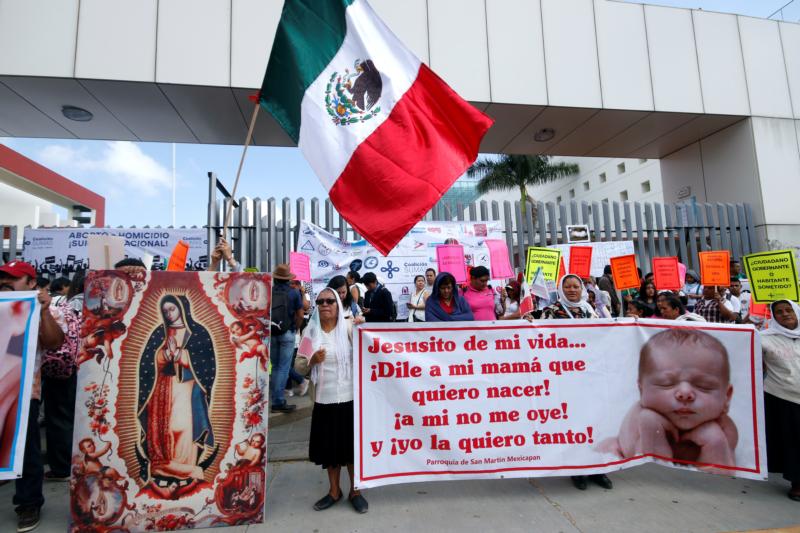Faced with a covert warning from the government about interfering in the political arena, the archdiocese of Mexico City released a statement defending its rights to speak out on public issues.
On April 26, Mexico’s Ministry of the Interior released a statement warning of sanctions against religious associations that intervene in partisan politics.
Recalling the previsions of the country’s Constitution and the Law of Religious Associations and Public Worship, the ministry urged “all religious actors, particularly ministers of worship, to conduct themselves in such a way that, in the current period of electoral campaigns, they continue contributing to the building of a fully democratic society respectful of constitutional precepts, within the framework of the secularity of the Mexican State.”
For much of the 20th century, Mexico suffered under some of the most anti-clerical laws in the non-Communist world. The Catholic Church was not recognized as a legal entity, clergy weren’t supposed to wear clerical garb, and the Church was forbidden to interfere in any way in politics. Although many of these restrictions were lifted in the 1990s, the strict separation of Church and State remains in the constitution.
Subsequently, it warned religious associations and leaders to “be careful not to incur in propaganda or political proselytism, whether in favor or against candidates, candidates, partisan ideologies or political parties.”
Mexico is headed to the polls June 26, and over 3,500 public offices are up for grabs. The Catholic vote is key, in a country where 80 percent of the population identify as Catholics. In the words of this week’s editorial from Desde la Fe [From the Faith], the weekly magazine of the Archdiocese of Mexico, “there’s no doubt, it will be an election that will affect the vision of the Mexico we will build in the next 15 to 20 years.”
The editorial rejects the accusation made by the Ministry of the Interior of the Catholic Church violating the principle of the secular State by taking positions on public issues. The argument from the Church is that through statements or comments regarding its position on different issues, it’s not associating itself with a political option or advocating for or against a particular party or candidate.
Several observers have argued that the April 26 statement from the government was intended as a response to the Mexican bishops urging the faithful to vote for political options that defend every human life and fundamental rights and in favor of policies that acknowledge parents’ rights to decide on their children’s education.
In the message issued after their Easter Assembly, the bishops had called on voters to “inform themselves as much as possible about the person and proposals of the candidate so that they can analyze them in conscience so that their vote may be free, reasoned and responsible, in coherence with our human and Christian values.”
The Archdiocese of Mexico newspaper defended the bishops’ freedom and right to remind the faithful what the teachings and doctrine of the Church are, arguing that in doing so, they’re not doing political advocacy.
The editorial also said the Church has a responsibility to help people discern between real needs and easy offerings, human rights from ideologies, and to seek the best option beyond marketing strategies and politically tinged attacks.
Doubling down, the unpenned editorial asks if voters are really “free” when they cast their votes, when surrounded by polls that have as their purpose “to influence our vote by telling us: ‘look who everyone is voting for’.”
“Polls are rarely done to inform, most are done to influence,” the magazine argues, after noting that human beings are very “socially influenced,” pointing out that when a crowd is looking up, the normal tendency is to look up, too.
Human beings are also “easy prey to the influence of information to which advertising is the best ally,” and politicians influence the electorate by linking positive images with political figures or parties.
“Finally, there is digital manipulation,” says the editorial. “All advertising is targeted according to our tastes, our conversations, the pages we visit, even the places we go to! All this data serves to show us only the world ‘they’ want us to see. This is how society is polarized, since the followers of one party will only receive advertising from that party and the opposing ones will receive advertising from theirs; thus, advertising isolates us ‘in our world’, without allowing us to see the whole picture.”
According to the editorial, at a time when party platforms are unclear and many candidates stand out more due to the “artistic trajectory than for their political experience,” a voter has to go the extra mile to know in whose hands to deposit the future of Mexico.
Building up on the editorial and the bishops’ message, Mexico’s Multimedia Catholic Center argued the government is not promoting a “secular state” but being hypocritical, always willing to quote the Gospel or Pope Francis when it serves their purpose, but openly attacking the Church or the hierarchy when the tide turns.
“It is necessary to rethink the secular state by reconfiguring the meaning of this principle, stripping it of the strange schizophrenia, especially in this administration that has placed much [trust] on Gospel texts and the papal cassock,” the center argues in a Sunday statement. “We have all witnessed the insistent quotes of the current president of Mexico about Pope Francis to give firm ground to his populist measures: ‘And although one can belong to any religion, we forget the Gospels, or we are not consistent… Why the poor first? Because that is the essence of the Gospels’, said President [Andres Manuel] Lopez Obrador, April 7, 2020 quoting the pope.”

